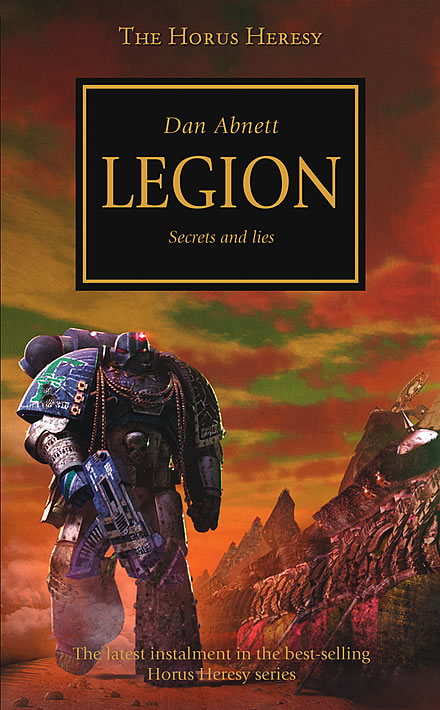Dan Abnett is arguably the best author working in the Black Library’s Warhammer 40,000 setting. He has a wonderful ear for dialogue and his characters tend to be well-drawn and to have understandable motivations, even if he introduces them only to kill them off a few sentences later. This is actually one of his favorite tricks, and it means that his novels, set in the splinter of the 40K setting known as the “Daniverse” are among the more colorful and well-populated.
Abnett also understands a key problem with 40K, which is that it’s actually sort of a shitty setting. Space Marines are dull, Imperial Guardsmen are idiots, and even Orks can get monotonous after a while. Sure, in the grim darkness of the far future there is only war, but you have to write about more than war or risk your novel turning into a Risk War Diary. Abnett’s solutions, at least in the novels I’ve read, are to avoid writing about Marines whenever possible, and to populate his stories with more-or-less normal humans who exist in cultures distinct from the usual kinda-like-Nazis-kinda-like-Victorians Imperium of Man. Legion, the 7th novel in the very long-running Horus Heresy series, set in the 30th Millennium, long before the “present” of the 40K universe. The novel purports to tell the tale of the Alpha Legion, youngest of the Space Marine Legions and one that we know in 40K as a dreaded Traitor Legion. In fact, like a lot of the Heresy novels Legion takes place mostly from the perspective of a series of bystanders, normal humans serving alongside the Alpha Legion in the vast non-Marine human armies.
John Grammaticus, an immortal psychic, works for a Cabal of aliens who have seen the future. They would like to meet Alpharius, leader and genetic template for the Alpha Legion, so they can warn him about a coming danger to the galaxy that the Legion might be able to help avert. The aliens don’t trust the humans, who are a young and violent species, and the humans don’t trust the aliens because various aliens have perpetrated mass slaughter against humans at times when the Imperium was weak. Wacky misunderstandings and hijinks ensue.
That’s pretty much the overarching plot of Legion, as dozens of schemes and machinations get in the way of Alpharius and the Cabal managing to meet-cute and talk about this awful risk in the future. Legion is 25 chapters long, and the first 23 are all about delaying the last two, where the real meaty stuff that actually pertains to the Heresy and why the Alpha Legion joined it comes into play. The book feels rather slight as a result, like a lot happens but very little of it means much in the big picture.
Abnett is great at setting a scene, though. He loves describing food and clothing in great detail – if you learn nothing else about a character who enters, you always know what they are wearing – and does his best to set his scenes in relatively interesting and distinct locales, though he does himself no favors on this count by setting the first half of the book in a desert. Even more importantly, Legion immediately establishes itself in a unique time and place by drawing on a lot of Indian culture for the language, ranks, dress and behaviors of the characters that he follows: they namaste rather than saluting, and the Imperial general formally greets Alpharius covered in gold paint and with 4 extra robot arms added to hold all of his swords, Mecha-Shiva style. The geno-soldiers used by the Imperium follow “uxors”, psychic adolescent girls who bind them together in a loose sort of hive-mind, but are also led by “hetmen”, independent captains who have their own military expertise to bring to bear. The effect of all of this, especially to reader expecting the Cadian Guardsmen of 40K tradition, is disorienting but eventually engaging and novel.
One place where Abnet has always had trouble is battle scenes. He seems to recognize this, as he tends to keep his focus tightened in on a few individual combats when writing action, and he excels at describing the back and forth of single combat. When he does attempt to describe action on a larger scale, it tends to run along the lines of “it was mass chaos; holy shit, war is hell”, without much more detail than that. this works out fine in his Inquisition books, which are really more like detective horror stories than war stories anyway, but in a large-scale tale set against the backdrop of a planetary invasion by tens of millions of soldiers, Abnett’s approach makes the war itself seem oddly absent.
Legion isn’t a great book. It didn’t even really need to be a novel; a short story or novella probably would have made the point. It’s an easy read at 400 or so pages, and has some amusing nuggets of information about the eventual unfolding of the Heresy and the motivations of some of the Traitors, but that’s about all. Fans of Dan Abnett will enjoy spending more time with his painterly voice, and those hoping for a change of pace from omst 40K stuff might have a look for the Eastern flair he gives the Imperium.
